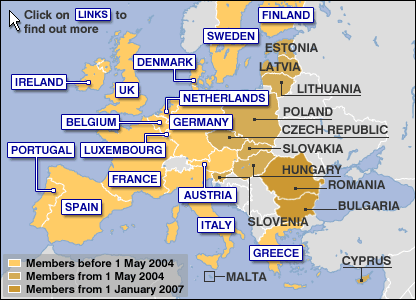Welcome
to Johnbirchall-economist.com!
(EU – Free
movement of labour)
LABOUR MARKET ACCESS
Subject to restrictions: Czech Rep, Estonia, Hungary, Latvia,
Lithuania, Poland, Slovakia, Slovenia (all 2004); Bulgaria, Romania (2007)
Open doors for 2004 entrants: Finland, Greece, Ireland, Portugal,
Spain, Sweden, UK
Open doors for 2007 entrants: Poland, Czech Republic, Slovakia,
Finland, Latvia and Estonia - and almost certainly Sweden

Austria
Workers from the eight former communist
states have to apply for work permits, at least until 2009. Like Germany,
Austria justifies the restrictions by pointing to its poor employment
situation and the fact that it is geographically close to the new members.
Expected to impose restrictions on workers from Bulgaria and Romania too
Belgium
Belgium
imposed restrictions on the eight former communist states which joined the
EU in 2004, and said in May 2006 it would not be lifting restrictions
imminently, but would improve access to some areas of the labour market.
For example, the Brussels region has asked for privileged treatment for
nurses, plumbers, electricians, car mechanics, builders, architects,
accountants, engineers and IT workers
Denmark
Since 2004, Denmark has allowed workers
from the eight states concerned to look for a job for six months. If they
find one, they can have residence and work permits. It will maintain this
system between 2006 and 2009 however the parliament has taken a decision
to make the labour market increasingly flexible.
Finland
Finland lifted all restrictions on
workers from the eight 2004 entrants on 1 May 2006. Previously, citizens
of the new member states could get a job without a work permit only if the
employment office decided there was no-one else available on the Finnish
labour market.
Finland was the first of the older EU
states to say it would open its doors to workers from Bulgaria and
Romania.
France
France intends to partially lift
restrictions, providing fast-track work permits in certain priority areas
where recruitment is a problem. These will include restaurant services,
industrial maintenance, construction, public works and health.
Germany
Like Austria, Germany has insisted on
continuing restrictions on workers from the former communist states,
beyond its eastern borders. Workers from these countries will have to
apply for work permits until at least 2009. However, the country issued
500,000 of these permits. "In practice Germany has given as many
people work as other big countries," EU Employment Commissioner
Vladimir Spidla said on 2 May 2006. Germany is expected to impose
restrictions on workers from Bulgaria and Romania too
Greece
Greece dropped all restrictions on 2004
entrants, as of 1 May 2006
Ireland
Ireland was one of three countries which
opened up its labour markets to all new member states immediately. It did,
however, introduce new rules whereby immigrants from all EU countries -
not just the new members - would be ineligible for benefits for two years.
Immigrants from the UK are the only exception.
However, Ireland decided to introduce a
work permit scheme for workers from Bulgaria and Romania, after facing an
influx of an estimated 200,000 workers from Central Europe between 2004
and 2006.
The minister for Enterprise, Trade and
Employment, Michael Martin, said: "We would argue that Ireland has
more than done its bit in terms of supporting the concept of mobility of
workers across Europe, and really can't be held to account on that
score."
Italy
Italy initially imposed restrictions on
2004 entrants, but has now dropped them all.
Luxembourg
Luxembourg is maintaining restrictions,
but will fast-track work permits for workers in certain sectors.
The
Netherlands
The Dutch government had said it would
lift all restrictions on 1 January 2007 but was forced to backtrack by
parliament. The question will now be reviewed at the end of 2006. The
Netherlands already allows fast-track work permits in certain sectors
Portugal
Portugal dropped all restrictions on
workers from the 2004 entrants on 1 May 2006. Between 2004 and 2006 it had
a 6,500 annual limit on immigrant workers of all nationalities.
Spain
Spain dropped all restrictions on
workers from the 2004 entrants on 1 May 2006. Foreign Minister Miguel
Angel Moratinos has said Spain will operate a work permit system for
workers from Bulgaria and Romania, for the first two years after their
accession, and will then apply an open doors policy. Some 400,000
Romanians are already working legally in the country.
Sweden
Sweden was one of the three countries,
along with the UK and Ireland, which chose to apply no restrictions to
workers from the new EU member states. It has indicated that it will take
the same liberal line with regard to workers from Bulgaria and Romania
UK
The UK was one of the three countries,
along with Ireland and Sweden, to place no restrictions on workers from
the 2004 entrants. However, workers have to register and only become
eligible for benefits such as Jobseeker's Allowance and income support
after working continuously in the UK for at least a year.
After an unexpectedly large influx of workers from
Central Europe - an estimated 600,000 in two years - the UK announced that
it would impose restrictions on workers from Bulgaria and Romania. Up to
20,000 will be allowed to take low-skilled jobs in agriculture or food
processing, high-skilled workers will be able to apply for work permits to
perform a skilled job, and students will be able to work part-time.
Self-employed people from Bulgaria and Romania are already allowed to work
in the UK and this will continue